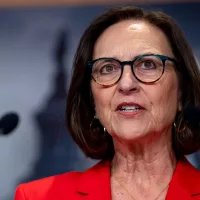
WASHINGTON – Thursday, U.S. Senator Deb Fischer (R-Neb.), a member of the Senate Armed Services Committee, questioned Secretary of the Air Force nominee Dr. Troy Meink and Under Secretary of Defense for Acquisition and Sustainment nominee Michael Duffey at their confirmation hearing.
During the hearing, Senator Fischer urged Dr. Meink to utilize all available tools to accelerate the Sentinel program and ensure that the Department of Defense works to improve the nation’s intercontinental ballistic missile (ICBM) capability. She also asked him about his plans to grow and evolve the Space Force.
Additionally, Senator Fischer questioned Mr. Duffey about his views on the importance of maintaining a strong nuclear deterrent. She emphasized that strengthening our nuclear triad and nuclear command, control, and communications (NC3) systems should be the top priority of the Department and the foundation of our strategic planning.
Fischer Questions Defense Leadership:
Senator Fischer: Having a safe, effective, reliable, and credible nuclear deterrent is the cornerstone of our national defense. Currently, each leg of our nuclear triad is undergoing a generational recapitalization to better align with the projected threat. The Department of the Air Force is responsible for two of the three legs: the land-based ICBMs and our bomber fleet. Dr. Meink, in your answers to the committee’s advance policy questions, you stated that, “the ground leg of the nuclear triad – Minuteman III and, over time, Sentinel – are foundational to strategic deterrence and defense of the homeland.” I agree with that. I also believe that we have an opportunity, following the analysis done during the Nunn-McCurdy breach, to incorporate lessons learned and build a stronger, more enduring Sentinel program than was originally proposed. Dr. Meink, if confirmed, will you commit to utilizing all available tools to accelerate Sentinel emplacement and ensure that our nation’s ICBM capability does move forward?
Dr. Meink: Thank you, Senator. If confirmed, I will do so, and I do appreciate the one-on-one conversation we had on this topic. I am looking forward to diving into the results of the Nunn-McCurdy, and then also obviously working the B-21 and the other activities, from a nuclear perspective, the Department supports.
Senator Fischer: Thank you. Mr. Duffey, if confirmed as Under Secretary of Acquisition and Sustainment, you will oversee all nuclear modernization efforts and serve as chair of the Nuclear Weapons Council. Can you provide us with a short summary of your views on why we need such a strong nuclear deterrent?
Mr. Duffey: Madam Chair, thank you for the question, and yes, I look forward, if confirmed, to assisting in leading the department in the oversight of the nuclear modernization program. Nuclear modernization, as you mentioned, is the backbone of our strategic deterrent, and ensuring that we have a modern, capable nuclear enterprise that not only includes the B-21, which is a successful acquisition program by all accounts, but the Columbia-class submarine and the Sentinel nuclear ICBM are critical. As chair of the Nuclear Weapons Council, I look forward to the partnership with the National Nuclear Security Administration, working with this committee to ensure that we maintain the highest quality systems that not only deliver the weapons but the nuclear command and control system that would be required for a safe and secure deployment, if necessary. And I think it’s absolutely critical that we ensure that we have accelerated acquisition of those capabilities. Thank you.
Senator Fischer: Thank you. Would you agree that our triad, along with NC3, the deterrent it provides, truly is the priority of the department, and that it underpins all of our strategic planning?
Mr. Duffey: I absolutely agree with that. Yes, ma’am.
Senator Fischer: Thank you. Dr. Meink, I believe we’re finally on a better path when it comes to space programs, and I’m impressed by what our Guardians have achieved over the last several years. But the Space Force is still a young organization, and there are likely still growing pains ahead. I am encouraged that the President nominated someone for this program with deep expertise in space programs. Dr. Meink, what’s your vision for how the Space Force should grow and how it should evolve as a service?
Dr. Meink: Thank you for the question, Senator. Yes, I’ve been fortunate enough to work space systems, both on the Air Force side, which then became the Space Force side, as well as from the IC side. Space is critical. This is actually one of the areas that we’re most challenged, I believe, from the rapidly evolving threat from China and others, both the direct threat to our systems as well as the threat those systems pose to our operations across the Department in general. I think the key to both acquisition and operations is making sure you have the best talented workforce. These are some of the most complicated systems, and if the U.S. is going to maintain our advantage, which we need to do in space, we need to make sure we have the right workforce. The Space Force is in the process of growing. I will support that activity to make sure we have the right numbers and the right skill set, and then make sure that the acquisitions themselves are delivering and that they’re getting into operation.
Senator Fischer: Can you give me a quick example of what new capabilities you think Space Force should be focusing on to acquire? Just a quick example?
Dr. Meink: I think some of the space control and counter space systems are critical. Senator, I can’t dive into too many of the details, but that is probably the area that we’re being most stressed from a threat perspective.
Senator Fischer: Okay, thank you.






